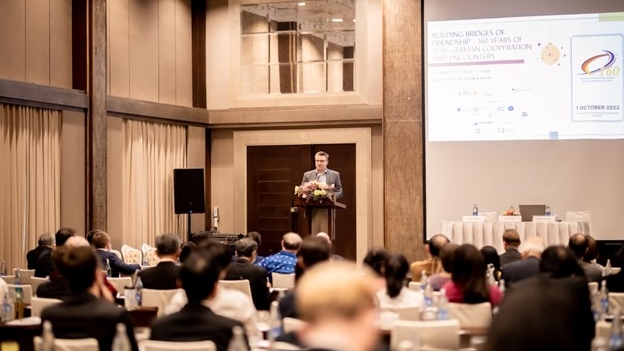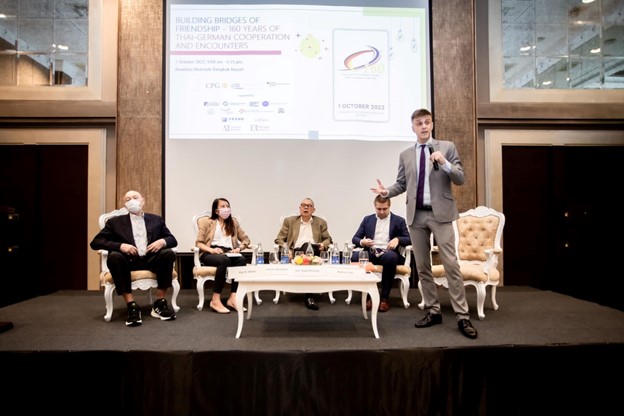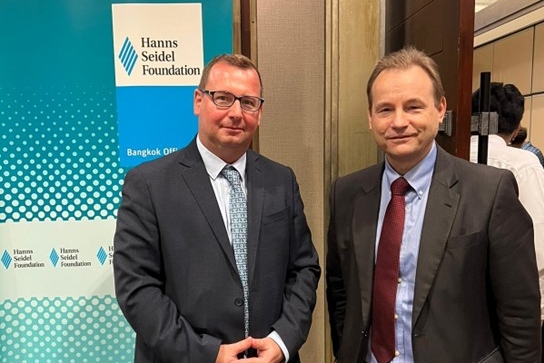Building Bridges of Friendship through 160 Years Thai-German Encounters and Cooperation
Building Bridges of Friendship through 160 Years Thai-German Encounters and Cooperation arranged on the occasion of 160 Years of Diplomatic Relations between Thailand and Germany
To commemorate 160 years Thai-German Relationship
CPG
While contacts between the peoples of Siam and Germany date back hundreds of years, the signing of a treaty of amity in 1862, during the rule of King Mongkut, became the basis of diplomatic relations between Thailand and Germany, back then a federation of multiple German states led by the Kingdom of Prussia.
The treaty added an official frame to both countries’ well-established and dynamic relations. During the following decades, Germany, like other European nations, and the modern Siamese nation-state in the making increasingly engaged in multiple encounters and cooperation. Areas in which these encounters took place to develop notable contributions to a crucial period of Siam’s modernization during the second half of the 19th and first half of the 20th century include German language and culture, military education, legal studies, architecture and engineering, to name only a few.
Cooperation created similarities, similarities closeness and appreciation on both sides, and over the decades Siam, which later became Thailand, and Germany developed a rich and dynamic web of relations with many impressive junctures while generations of Thai and Germans enjoyed participating in this lasting and fleckless friendship.
Roundtable: Thai-German cooperation – Cross-cultural experiences and reflections
CPG
Until the present time, these multi-layered relations have continued to develop and expand. Thai alumni of German universities are teaching at Thailand´s best faculties and their students continue to receive a part of their higher education in Germany. The importance Germany is attributing to Thailand is reflected by the number of German institutions being active in the country. Among them are cultural mediators such as the German Academic Exchange Service (DAAD) and the Goethe-Institut, the five political party foundations or bilateral projects such as the German-Southeast Asian Center of Excellence for Public Policy and Good Governance (CPG) at Thammasat University.
Among the many joint educational projects is the German-Thai Dual Excellence Education (GTDEE) project, a vocational education and training program set up in 2013, and last year, the German Research Foundation launched a funding program for joint virus research projects.
H.E. Georg Schmidt (r), German Ambassador to Thailand and Dr. Axel Neubert (l), Regional Representative HSF Thailand/Laos
HSF
In the economic field, more than 600 German companies employ around 200,000 people in Thailand, among some of the biggest German companies but also German enterprises that have been established in Thailand at the very beginnings of modern Thailand, such as B. Grimm. Over the past five years the German Ministry for the Environment, Nature Conservation and Nuclear Safety has funded the Thai-German Climate Programme that aims at contributing to the decarbonization of the Thai economy.
It is against this background and on occasion of the celebrations of 160 years of diplomatic relations between Thailand and Germany, that the organizers offer everyone interested a colorful day, full of interesting information, personal exchanges, and the opportunity to meet old friends and get to know new ones.
The topics of the seminar and talk program include aspects of the cultural exchange between Thailand and Germany, German influences on Thai constitutionalism, and Thai-German cooperation in science and economy.



